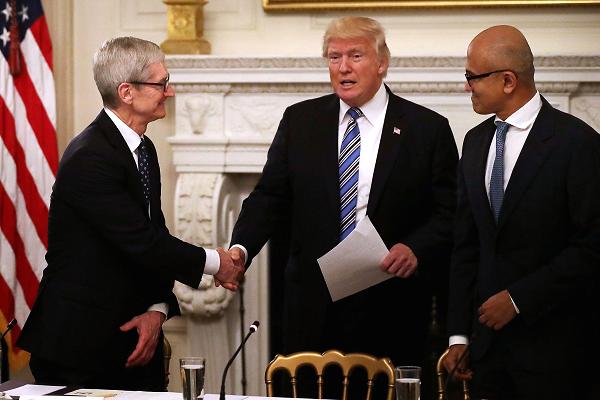Frankly, I’m surprised most of the CEOs stuck around this long on President Trump’s business advisory panels. The interests of most big businesses and Trump’s middle-America base are often at odds, especially on topics such as illegal immigration and climate change. It seems that most of the CEOs who chose to participate did so simply to avoid starting off on the wrong foot with a new administration. Furthermore, it’s much better to take a “wait and see” approach than to run afoul of an American President with the propensity to affect stock prices with a negative tweet about your company.
The Wall-Street Journal reports on the advisory council break-up:
Few chief executives openly supported candidate Donald Trump in the 2016 election. Yet by the time of his inauguration, many were expressing cautious optimism they could work with a president who presented himself as a leader with business acumen.
Many of Mr. Trump’s stated priorities—lighter regulation and a tax overhaul —are supported by corporate leaders. Comforting some executives, Mr. Trump appointed several CEOs to his cabinet, such as Exxon Mobil Corp.’s Rex Tillerson and billionaire investor Wilbur Ross.
“Everyone wanted to support the president in making the country and its economy better,” said Kathryn Wylde, chief executive of the Partnership for New York City, a group that represents major Wall Street firms and U.S. companies, and who led a CEO delegation to the White House earlier this year.
One of the issues that started the break-down of relations was the President’s decision to withdraw the United States from the Paris Climate Accord. This decision, while popular with the base, was not popular with many businesses, especially the ones who work in green energy and depend on government backing for climate change policy and research.
However, the straw that broke the council’s back was the President’s reaction to the violence in Virginia this past week:
Last week saw a parade of top executives distancing themselves from the president, in some cases sharply, in response to his comments about racial violence in Charlottesville, Va. Once executives started quitting the president’s advisory councils, the groups disbanded, a rare instance of companies putting themselves squarely, albeit unwillingly, into the political sphere.
“The social issues became too difficult to navigate,” said Ms. Wylde.
Charlottesville was the tipping point, not the cause. Behind the scenes, some executives say, ties had been growing strained for months.
These CEO relationships were quaint and probably well-intentioned from the beginning, but they were strained almost immediately as President Trump has a keen way of irritating basically everyone outside of his core supporters. President Obama was famous for having the CEO of Google visiting the White House more than probably anyone else, and he maintained strong relationships with many other corporate leaders and boards. The difference, however, was that many businesses have signed-on to a big-government agenda, and have aligned with several progressive causes when it comes to social issues or economic policy.
When Donald Trump has supporters chanting about building a wall on the southern border, you can almost hear every CEO in Silicon Valley literally screaming themselves to sleep at night. I was amazed that he was able to get so many of them to sit down at a table with him from the beginning.
In some respects, there should be a very healthy separation between big business and the federal government. There are too many opportunities for lobbying on behalf of corporate causes and I think we’d do well as a country to build a wall, so to speak, between business and government. This separation helps create a more competitive market and have an economy that is less prone to the government picking winners and losers.
Donate Now to Support Election Central
- Help defend independent journalism
- Directly support this website and our efforts
